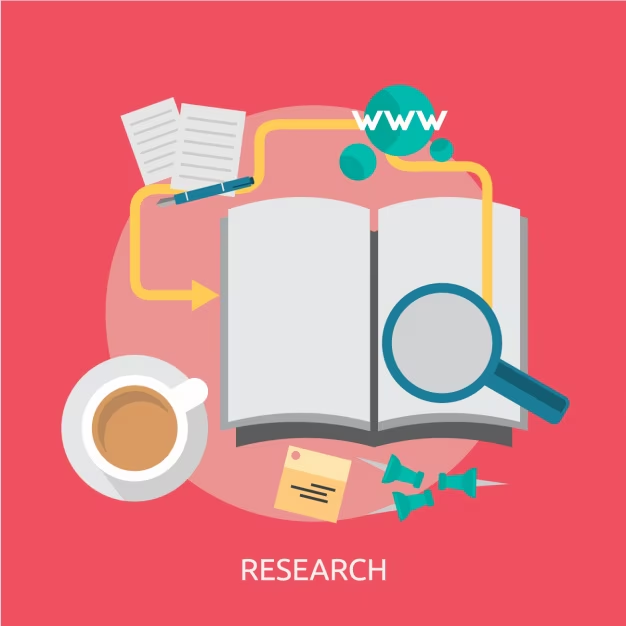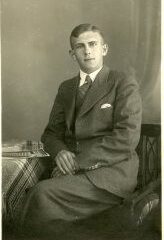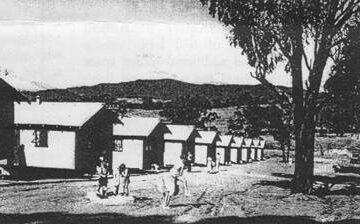
Are you interested in your Dutch Australian family history? Did your parents, grandparents, or great-grandparents migrate to Australia from the Netherlands? Or maybe you migrated to Australia from the Netherlands yourself and want to research your family history but don’t know where to start? Don’t worry, we’ve got you covered! This article contains advice and resources to help you on your Dutch Australian family history journey.
Note: Some of the resources listed on this page are not English-language. You can use Google Translate or the Google Translate browser extension to help you (NB: DACC cannot guarantee translation quality).
On this page:
Dutch Sources and Resources
Australian Sources and Resources
Researching Indonesian links in your family
General Advice
Dutch Sources and Resources
Do you have Dutch ancestors and want to know more about them? Dutch resources to get you started on your Dutch Australian family history research journey include:
- Archieven.nl
A database drawing from the digitised records of various Dutch archival organisations. Archieven.nl is a good place to start researching ancestors in the Netherlands. - Centrum voor Familiegeschiedenis (Dutch Family History Centre, CBG)
The Dutch Family History Centre’s website includes different source types (e.g. family trees, family crests, surnames, library & other collections) and helpful blog posts. - Delpher
Database of digitised Dutch-language books, magazines, newspapers, government gazettes, and other documents. - Genealogie Online (Genealogy Online)
An online Dutch genealogy database containing family trees, personal profiles, and links to archival sources in the Dutch Nationaal Archief (National Archive, NA – see below) and other collections. - Lijst van gevallenen (List of the Fallen)
Database of Dutch deaths in conflicts the Netherlands has participated in since World War II. Search the database by name or by conflict. - Nationaal Archief (NA)
The Dutch national archive, located in The Hague. Its collections contain photos, documents, military records, government records, passenger lists, research guides, and more. The NA also has a dedicated page for family history research. - Netherlands Institute for War, Holocaust and Genocide Studies (NIOD)
A leading Dutch research institute, particularly for war research. NIOD’s collections may be helpful for researching ancestors who served in the Dutch armed forces. NIOD has an archive (partly accessible online, partly in person – access restrictions apply), an image collection, and a library (accessible in person only). - Online Begraafplaatsen (Cemetries Online)
A catalogue of cemeteries in the Netherlands and overseas. Search by cemetery, location, or by name. Similar online databases are available at Graftombe.nl and Begraafplaatsenonline Nederland. - WieWasWie (Who Was Who)
A genealogy database run by the CBG. Search for people by their name. - Yory
A website with information about Dutch family trees and family history research. Yory has research guides, advice and tips about sources and information.
A note on Dutch archives
The Netherlands has different types of archives: local, provincial, and national. All three types can contain information about your Dutch ancestors. Check out this useful guide to the Dutch archives by Dutch genealogist Yvette Hoitink.
If you are researching ancestors with links beyond the Netherlands (including to former colonies like Indonesia or Suriname), try looking in archives in those countries. For ancestors with links to (colonial) Indonesia, see the separate section ‘Researching Indonesian links in your family‘ further down on this page.
Other resources:
- Dutch Genealogy
Genealogist Yvette Hoitink’s website, full of useful information about researching family history in the Netherlands. The website also has blog posts explaining the meanings of Dutch terms you might come across in your research. - Uit de oude koektrommel
Genealogy website run by Tanja Enklaar, containing resources, guides, explainers and advice about Dutch family history research. This website includes lists of genealogy sources for the Netherlands (and beyond), military research, World Wars I and II, migration, and more.
Australian Sources and Resources
The majority of Dutch migrants to Australia emigrated in the twentieth century. Many of the resources below include information about migration journeys, such as passenger or shipping lists, emigration cards, or migrant hostels and camps.
Useful Australian resources and guides for researching Dutch Australian family history include:
- Emigration cards
Between 1946 and 1991 Dutch migrants to Australia completed emigration cards for their migration journey. Once part of the DACC’s own collection, the more than 55,000 emigration cards represent between 80-90% of Dutch migrants to Australia. The cards can now be perused online at the Dutch National Archive (Nationaal Archief). Note that not all information in these cards is available online due to privacy restrictions. - Shipping and passenger lists
Check out our article on shipping lists. Passenger lists are also available from Australia’s state and national libraries (see below). - List of World War II Refugees to Australia
Was your relative a refugee during World War II? If so, you may like to peruse this list of ships with WWII refugees that arrived in Australia. Each ship should have a transcribed passenger list. This list is maintained by the Immigrant Ships Transcribers Guild. - Hostel Stories: Find Your Family
A great guide by DACC researcher Dr. Karen Agutter about researching Dutch people who migrated to Australia in the mid-20th century and passed through migrant camps or hostels. This guide contains advice about using Australia’s national and state archives in your search. - TROVE
Operated by the National Library of Australia, the TROVE search engine is a fantastic resource to search through Australian records, including newspapers, magazines, official documents, naturalisation records, etc. You may like to search it for mentions of a relative, or the ship they arrived on if you know its name. - Welcome Walls
Some migrants to Australia are listed on the Welcome Walls in at the Australian National Maritime Museum in Sydney and at the Western Australian Maritime Museum in Fremantle, and at Albany. Search the databases for migrants who are named on the walls. - The National Archives of Australia has a factsheet about the records of Dutch migrants held in Sydney.
- Links about migrant camps and centres (listed alphabetically):
- Bathurst Migrant Camp
- Benalla Migrant Camp
- Bonegilla Migrant Experience
- “Migrant Accommodation Camps”, National Archives of Australia (an overview of different migrant reception and training centres).
- National Monument to Migration Name Search, Australian Maritime Museum (search a database of names on the National Monument to Migration in Sydney)
- Western Australia Welcome Wall database
State Libraries & Archives
Australia’s National and State Libraries, Archives, and Public Records Offices have guides, how to’s, and advice about using their collections for family history research. Not everything these institutions offer will be relevant for Dutch Australian family history research, but there is useful information available, such as shipping and passenger lists. Keep an eye out also for special family history events at these institutions.
Australia (national)
- National Library of Australia (the NLA’s TROVE database is a wonderful resource for research about Australia)
- National Archives of Australia (relevant research guides include the family history research guide, information about immigration and citizenship, and the Immigration Photographic Archive)
New South Wales
Queensland
- State Library of Queensland
- Queensland State Archives (with specific guides to Queensland family history research and Queensland immigration)
- Registry of Births, Deaths and Marriages
South Australia
- State Library of South Australia
- State Records of South Australia (with a research guide to South Australian family history, and passenger lists for arrivals in South Australia between 1845-1886 and 1888-1940)
- Births, Deaths and Marriages
Tasmania
- State Library and Archives of Tasmania (with a family history guide)
- Information about births, deaths and marriages in Tasmania
Victoria
- State Library of Victoria
- Public Record Office Victoria (research guides include the passenger records and immigration guide and the family history guide)
- Registry of Births, Deaths and Marriages
Western Australia
- State Library of Western Australia
- State Records Office of Western Australia (peruse passenger lists here)
- WA Registry Index
Other resources and organisations:
- Australasian Federation of Family History Organisations (AFFHO)
- Australian Cemeteries Index
- The Ryerson Index (an index of death notices and obituaries in Australia)
- TraceYourDutchRoots.com, managed by Henk van Kampen
- Your local history and/or genealogical society.
Researching Indonesian links in your family
Does your family have connections to Indonesia or the former Dutch East Indies? Some Dutch people emigrated to Australia from Indonesia, which until 1945 was a Dutch colony – known in Dutch as Nederlands-Indië (old spelling: Nederlandsch-Indië), or just Indië.
If you have Dutch-Indonesian links in your family, you may find these resources useful:
- 30 dagen op zee (30 Days at Sea)
A database of migration journeys between 1945-1968 from Indonesia to the Netherlands. Contains information about passenger lists, individual passengers, migration ships, and migration journeys. Run by the Indisch Herinneringscentrum (see below). - Arsip Nasional Republik Indonesia (Indonesian National Archive, ANRI)
Indonesia’s national archive, which contains information about Indonesia’s colonial history. Not all materials are available online; some are accessible only in person in Indonesia. - Bersiapkampen
A database of people interned in ‘bersiap camps’ in Indonesia between 1945-1947. - Centrum voor Familiegeschiedenis (Dutch Family History Centre, CBG)
The Dutch Family History Centre’s website includes different source types (e.g. family trees, family crests, surnames, library & other collections) and helpful blog posts. CBG membership provides access to more resources.- This CBG webpage provides an introduction to researching Indo-European, Indonesian, and Chinese ancestors from colonial Indonesia/the Dutch East Indies.
- CBG manages the Indisch Oud-paspoortarchief (Indisch old passport archive), accessible via WieWasWie
- The CBG series Voorouders van verre (Ancestors from Afar) contains guides for researching ancestors from Indonesia – including the Moluccas -, Suriname, Turkey, the Caribbean, China, and more (access with CBG membership).
- Database Gelijkstellingen, Toepasselijkverklaringen en Naturalisaties Nederlands-Indië en Indonesië (Database of equations, declarations of applicability and naturalisations in the Dutch East Indies and Indonesia)
This database contains information relating to equations, declarations of applicability, and naturalisations of persons in colonial Indonesia. It is is managed by Dennis de Calonne and Tjaart Schillhoorn van Veen. - Database Nederlandse dwangarbeiders Birmaspoorweg (Database of Dutch forced labourers on the Thai-Burma Railway)
This database contains the names of 17,688 Dutch people who were forced to work on the Thai-Burma railway during World War II. - Indisch Familiearchief (Indisch Family Archive)
A family history archive for Dutch and Indo-European families with links to the Dutch East Indies. Use the index on the IFA’s website to search for surnames and discover what information is in the IFA’s collections. Note: collection material is not available online. - Indisch Herinneringscentrum (Indisch Memory Centre, IHC)
IHC is an organisation which teaches the public about the Indisch past, assists with genealogy research, and runs events. IHC has a visitor centre in The Hague and online resources including the database 30 dagen op zee (see above). - Indische Genealogische Vereniging (IGV)
An association for people conducting genealogy research about the Dutch East Indies. - Japanseburgerkampen
A database of civilian internees in Japanese camps in Indonesia during World War II. Contains information about civilian internees, the camps, and transfers between camps. - Japanse krijgsgevangenkampen
A database of Dutch prisoners of war (POWs) in Asia during World War II. Contains names of POWs and information about POW camps. - Museum Bronbeek
Bronbeek is both a museum and a home for veterans of the Royal Netherlands East Indies Army (KNIL). Its collection can be perused online, although items may only be viewable in person. - Name list: Born in Nederlands Indië/Dutch East Indies
A list of names of individuals born in the Dutch East Indies in the 20th century and who have since passed away. The website provides surnames, year of birth, and links to naturalisation information if applicable. - Ons Land (Our Land)
Launched in 2024, this database contains primary sources, timelines and maps about the Netherlands’ shared history with Indonesia, mainly focusing on World War II and the decolonisation period. - Roosje Roos
An online database of the colonial Civil Register (Burgerlijke Stand) and a geneaology business of the same name run by Maarten and Willy Etmans. - WieWasWie (Who Was Who?)
A Dutch genealogy database run by the CBG.
A list of regionally-specific resources for Indisch genealogy research is available on this page from the website Uit de oude koektrommel.
General Advice
Do a Google search
Starting your family history research with a Google search is a good way to start your research. Searching Google allows you to cast the net wide and see what information is easily available about your family. Make sure to check Google Images and Google Books as well as the regular Google search engine.
Tips for using Google or other search engines:
- Search for specific names by excluding other results.
- E.g.: If your grandfather was called Jan Smit and was born in Amsterdam, use quotation marks to search for “Jan Smit” Amsterdam.
- If you know the name of the ship your family emigrated to Australia on, try adding that to your search (you can also add date of arrival in Australia or departure from the Netherlands to further narrow the search results).
- E.g.: “Jan Smit” AND “Johan van Oldenbarneveld”
- More handy tips to harness the power of Google can be found in this 2016 article from The Guardian.
Start with what you know
Look for information about ancestors for whom you already have some details (e.g. names, dates or places of birth or death), before going deeper into your family tree. Use records you already have in your possession – birth certificates, death notices or obituaries, military records, newspaper articles, baptism records, notices of engagement and marriage – to point you to further information. Documents like these can all provide valuable information about your ancestors: where they lived; names of parents, spouses, or children; information about migrations or relocations, etc.
Persevere!
More items are being digitised around the world – you never know what will turn up in your searches. If you don’t find anything at first, try again later. Search using different spellings or different keywords.

Note: This page is a non-exhaustive list of resources for Dutch Australian family history and genealogy research. If you’d like a particular resource to be added to this page, please email us at dutchaustraliancc@gmail.com.


